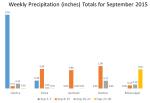SPICKARD, Mo. – Beef producers at the MU Thompson Farm field day were urged to look at the end product from their cow herds by Mike Kasten, who has been doing that for years in his farm herd near Millersville, Mo.
“What you produce ends up on somebody’s plate,” Kasten said. “Somebody is going to eat it.”
He described “Quality Beef (QB) by the Numbers,” a production-and-marketing program rolled out in August at the University of Missouri-Columbia.
“‘Quality Beef’ focuses on the end product,” he said. The program will enroll producer herds, aiming to bring increased value back to the farm where the cattle were bred.
“Genetics make the difference. And you have total control of the genetics in your herd,” Kasten told 135 people at the field day on the MU research farm in Grundy County.
The cattle breeding protocols were developed at Thompson Farm by David Patterson, MU beef reproduction specialist.
By selecting for genetics, producers can breed more Choice- and Prime-grade cattle that bring more money at market time.
The QB program offers members a way to track performance of their cattle through feedlot and packing plant. With carcass reports, breeders learn not only the yield and grade of their cattle, but also the economic value of their cattle and the premiums paid for high-quality beef.
Scott Brown, MU beef economist, showed charts of increasing prices paid for Prime beef, payback to producers for superior genetics. “Top Prime premiums can add $400 to $500 per head in value.”
Increasingly, consumers are willing to pay for good eating experiences, Brown said. U.S consumers, as well as new buyers around the world, want high-quality beef.
“China’s economy is growing at 7 percent per year. They want more meat in their diet.”
The selling of cows during the drought will only shrink beef supply in the face of increasing demand, Brown said.
Other MU Extension specialists at the field day told ways for producers to feed their cattle this winter following the deep drought that reduced feed and forage.
The field day program was rearranged as a result of the drought, said Rod Geisert, superintendent of Thompson Farm.
Kasten said an added value of the QB program, in addition to carcass data, will be economic reports from the QB record-keeping program.
“Without records, you can’t tell your most valuable cows,” Kasten said. “They can all look alike but have wide range in value. The difference is genetics.”
Earlier, after first seeing economic returns from high-quality Thompson Farm cattle presented by economist Brown, Kasten looked at records on his own herd.
He was surprised to find his most valuable cow, based on value of her calves, was what Kasten called “a nondescript cow I’d never given much attention before.” Turns out she was the result of five generations of artificial-insemination (AI) breeding to superior sires.
“I give her a lot more attention now,” he said. “I had a lot of other cows that I thought were better.”
Kasten has been hired to head the MU Quality Beef program. After his talk, several area producers gathered around to sign up.
Kasten called the AI research from Thompson Farm an “incredible tool for producers to improve their herds.”
“The research out of MU is easy to understand. It’s not some lofty, hard-to-read research. They bring it down to our level,” Kasten told farmers. “You can put this research together on your operation and make it pay. It works on my farm.”
Kasten was an early adopter of AI protocols for the Show-Me-Select Replacement Heifer Program. He served as first president of the statewide SMS organization and has been a regular consignor to the bred-heifer sale at Fruitland, Mo., in Cape Girardeau County.
The QB program evolved out of selling the steer mates of high-quality replacement heifers.
MU Thompson Farm is part of the MU College of Agriculture, Food and Natural Resources.
For more information about Quality Beef by the Numbers, go to www.quality-beef.com.
Read more http://extension.missouri.edu/news/DisplayStory.aspx?N=1529





